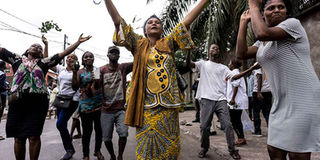DR Congo, a vast and unruly African giant

A group of Catholic faithful dance and chant slogans on February 25, 2018 as they demonstrate outside the St Francois De Sales Church, Kinshasa, during a protest called on by the Catholic Church to push the nation's President to step down. PHOTO | JOHN WESSELS | AFP
What you need to know:
- Civil war broke out almost immediately after independence and the DRC has since been run by a series of strongmen.
- Today, the eastern provinces of North Kivu and South Kivu are major centres of unrest involving rival militia.
- The watchdog Transparency International ranked it 156 out of 176 countries in its 2016 corruption index.
KINSHASA
The second largest country in Africa, the Democratic Republic of Congo is blessed with abundant raw materials and minerals but cursed by violence, graft and poverty.
Eighty times the size of its former colonial master Belgium, the DRC covers 2.3 million square kilometres (919,595 square miles) in the middle of Africa, behind only Algeria in area on the continent.
Fewer than 40 per cent of its population of 78.7 million people (2016) live in urban areas, according to the World Bank.
It is a nation plagued by conflict and disunity.
While the official language is French, it has four indigenous national and 200 vernacular languages, hampering the forging of a national identity since independence in 1960.
SEKO COUP
Civil war broke out almost immediately after independence and the DRC has since been run by a series of strongmen.
Mobutu Sese Seko grabbed power in a coup in 1965, imposed the name Zaire and set up a dictatorial kleptocracy that lasted 32 years.
In 1997 he was toppled by rebel leader Laurent-Desire Kabila, who renamed the country after the mighty Congo river.
Kabila's son Joseph inherited the presidency after his father was killed by a bodyguard in 2001.
He went on to win elections in 2006, the first free polls since independence, and a second term in 2011.
Kabila was meant to step down in 2016 at the end of a two-term limit, but declined.
WARS
He stayed on thanks to a constitutional clause enabling a president to remain in office pending the election of a successor, but his refusal to go prompted demonstrations met with bloody crackdowns.
Under an agreement brokered by the Catholic Church, he was allowed to stay in office provided new elections were held in 2017.
But there was a new delay until December 23, 2018, blamed on organisational problems amid surging violence.
Two wars in the DRC in the late 1990s and early 2000s dragged in at least six armies and left more than three million dead in Africa's deadliest conflicts in recent history.
Today, the eastern provinces of North Kivu and South Kivu are major centres of unrest involving rival militia.
REFUGEES
Central Kasai province is another hotspot, tipping into violence in 2016 after soldiers killed a tribal chief leading a rebellion against the central government.
More than 3,000 people have died in the region since then.
In January 2018, the UN said there were some 4.25 million displaced persons in the country and 600,000 DR Congo refugees in sub-Saharan Africa.
Two outbreaks of Ebola, respectively the ninth and 10th in the country since 1976, have occurred this year, claiming 40 lives.
The DRC has the potential to be one of Africa's wealthiest countries "if it can overcome its political instability", the World Bank says.
MINERALS
It is the world's leading producer of cobalt, a key ingredient in top-range batteries including for smartphones and electric cars, and a top supplier of coltan, another mineral used for electronic products.
It is also Africa's top producer of copper and sits on hydrocarbons, tropical timber, gold, diamonds and other minerals.
But competition for the wealth has bred conflict, graft, smuggling and mismanagement.
The watchdog Transparency International ranked it 156 out of 176 countries in its 2016 corruption index.
Economic growth slumped to 2.4 per cent in 2016, its lowest since 2001, the World Bank says.
This was mainly due to declining prices and a shrinking global demand for raw materials.
The poverty rate dropped to 64 per cent in 2012 (World Bank), but the DRC still ranks among the world's poorest countries.





